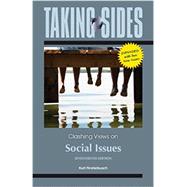
Note: Supplemental materials are not guaranteed with Rental or Used book purchases.
Purchase Benefits
What is included with this book?
Table of Contents TAKING SIDES: Clashing Views on Social Issues Seventeenth Edition, Expanded Unit 1 Culture and Values
Unit 2 Sex Roles, Gender, and the Family
Unit 3 Stratification and Inequality
Unit 4 Political Economy and Institutions
Unit 5 Crime and Social Control
Unit 6 The Future: Population/Environment/Society
Unit 7 Bonus Issues—Special Topics for Today
|
The New copy of this book will include any supplemental materials advertised. Please check the title of the book to determine if it should include any access cards, study guides, lab manuals, CDs, etc.
The Used, Rental and eBook copies of this book are not guaranteed to include any supplemental materials. Typically, only the book itself is included. This is true even if the title states it includes any access cards, study guides, lab manuals, CDs, etc.